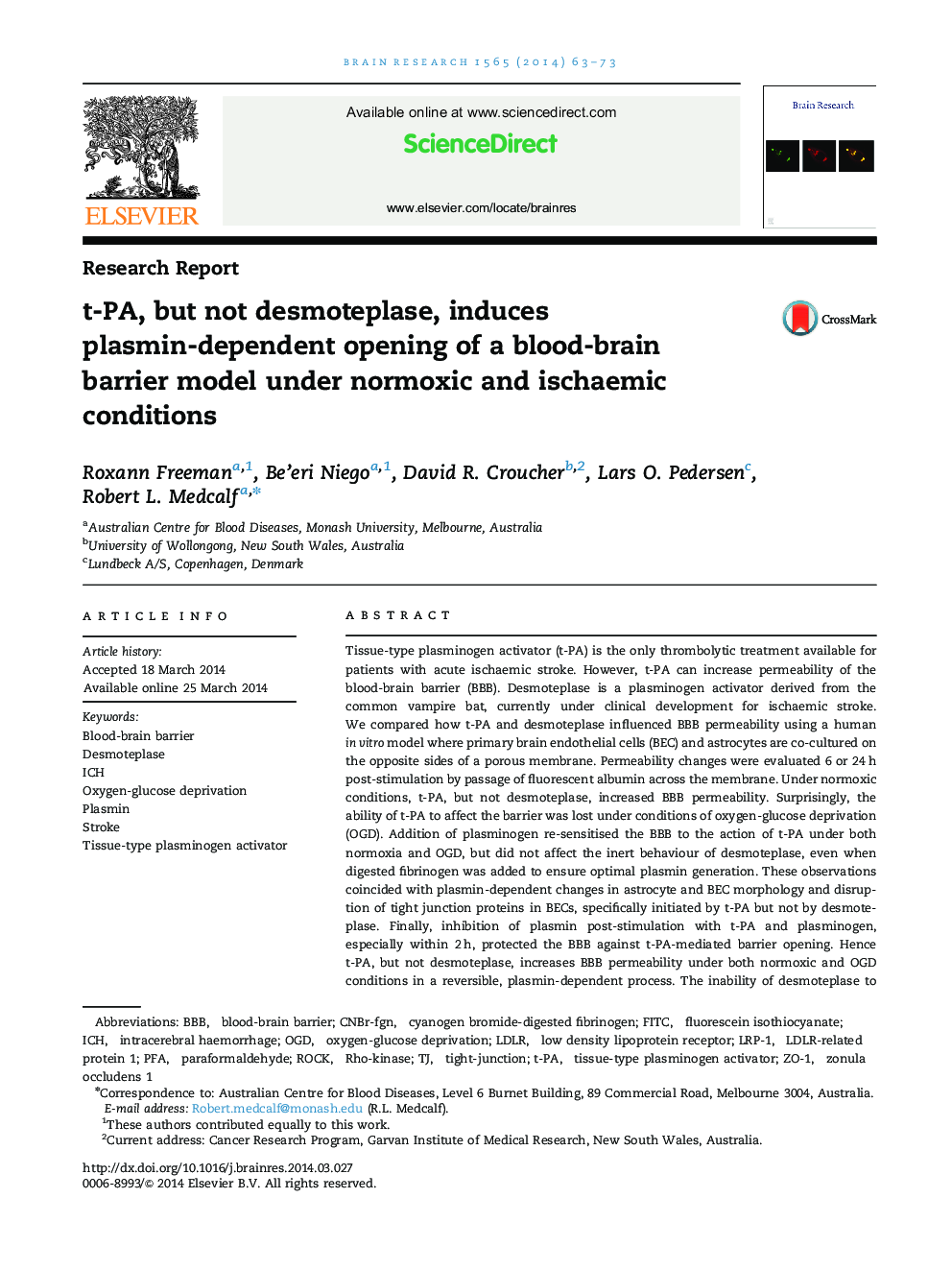| کد مقاله | کد نشریه | سال انتشار | مقاله انگلیسی | نسخه تمام متن |
|---|---|---|---|---|
| 4324288 | 1613874 | 2014 | 11 صفحه PDF | دانلود رایگان |
عنوان انگلیسی مقاله ISI
t-PA, but not desmoteplase, induces plasmin-dependent opening of a blood-brain barrier model under normoxic and ischaemic conditions
دانلود مقاله + سفارش ترجمه
دانلود مقاله ISI انگلیسی
رایگان برای ایرانیان
کلمات کلیدی
PFATight-junctionLRP-1ZO-1OGDLDLRt-PARho-kinaseFITCIntracerebral haemorrhage - خونریزی داخل مغزیBBB - سد خونی مغزیStroke - سکته مغزیzonula occludens 1 - شل و بسته 1Tissue-type plasminogen activator - فعال کننده بافت پلاسمینوژنfluorescein isothiocyanate - فلوئورسین ایسوتیوسیاناتBlood-brain barrier - مانع خون مغزیOxygen-glucose deprivation - محرومیت گلوکز اکسیژنICH - منparaformaldehyde - پارافرمالدهیدPlasmin - پلاسمینlow density lipoprotein receptor - گیرنده لیپوپروتئین چگالی کمRock - یا راک
موضوعات مرتبط
علوم زیستی و بیوفناوری
علم عصب شناسی
علوم اعصاب (عمومی)
پیش نمایش صفحه اول مقاله

چکیده انگلیسی
Tissue-type plasminogen activator (t-PA) is the only thrombolytic treatment available for patients with acute ischaemic stroke. However, t-PA can increase permeability of the blood-brain barrier (BBB). Desmoteplase is a plasminogen activator derived from the common vampire bat, currently under clinical development for ischaemic stroke. We compared how t-PA and desmoteplase influenced BBB permeability using a human in vitro model where primary brain endothelial cells (BEC) and astrocytes are co-cultured on the opposite sides of a porous membrane. Permeability changes were evaluated 6 or 24Â h post-stimulation by passage of fluorescent albumin across the membrane. Under normoxic conditions, t-PA, but not desmoteplase, increased BBB permeability. Surprisingly, the ability of t-PA to affect the barrier was lost under conditions of oxygen-glucose deprivation (OGD). Addition of plasminogen re-sensitised the BBB to the action of t-PA under both normoxia and OGD, but did not affect the inert behaviour of desmoteplase, even when digested fibrinogen was added to ensure optimal plasmin generation. These observations coincided with plasmin-dependent changes in astrocyte and BEC morphology and disruption of tight junction proteins in BECs, specifically initiated by t-PA but not by desmoteplase. Finally, inhibition of plasmin post-stimulation with t-PA and plasminogen, especially within 2Â h, protected the BBB against t-PA-mediated barrier opening. Hence t-PA, but not desmoteplase, increases BBB permeability under both normoxic and OGD conditions in a reversible, plasmin-dependent process. The inability of desmoteplase to increase permeability despite its capacity to generate plasmin provides further support for its use as thrombolytic in patients with ischaemic stroke.
ناشر
Database: Elsevier - ScienceDirect (ساینس دایرکت)
Journal: Brain Research - Volume 1565, 27 May 2014, Pages 63-73
Journal: Brain Research - Volume 1565, 27 May 2014, Pages 63-73
نویسندگان
Roxann Freeman, Be׳eri Niego, David R. Croucher, Lars O. Pedersen, Robert L. Medcalf,